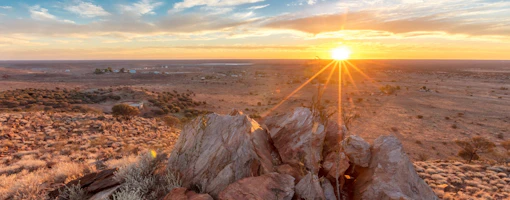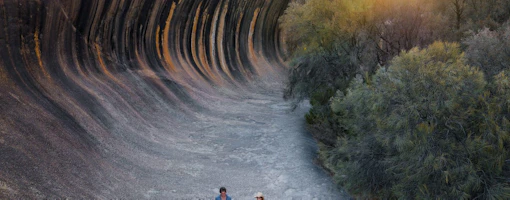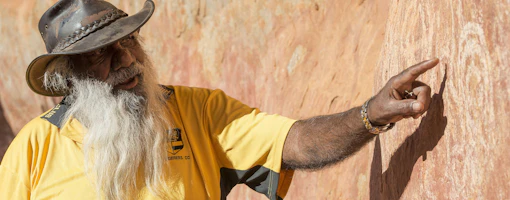
Important Travel Tips
- Plan
- Important Travel Tips
Time Zone
Australia’s Golden Outback shares the same time zone as the rest of Western Australia (GMT+8). It is two hours behind Queensland, New South Wales, Victoria, Australian Capital Territory and Tasmania time and one and a half hours behind South Australia and Northern Territory time.
Temperature and Climate
The weather and climate in Western Australia’s Golden Outback, which takes up more than half of Western Australia, varies considerably as you travel across the region.
Average temperatures range from 15ºC in winter and can reach as high as 45ºC in the summer months. You should ensure that you and your vehicle are suitably prepared for the variations in conditions in the seasonal climate.
Below are some of the average temperatures (degrees Celsius) for some of the towns throughout Australia’s Golden Outback.
|
Dec-Feb |
Mar-May |
Jun-Aug |
Sep-Nov |
|
|
Esperance |
25 |
23 |
27 |
21 |
|
Kalgoorlie |
32 |
25 |
18 |
25 |
|
Merredin |
33 |
23 |
15 |
21 |
|
Narrogin |
30 |
23 |
15 |
21 |
|
Meekathara |
37 |
29 |
20 |
29 |
For more information about the weather and climate in Western Australia’s Golden Outback please visit the Bureau of Meteorology’s website.
Road Safety
Western Australia’s Golden Outback observes the same driving laws and regulations as the rest of Australia. Vehicles travel on the left-hand side of the road and it is compulsory for all passengers to wear seatbelts.
You are permitted to drive on a current out-of-state or overseas licence for a period of one year. If you hold an out-of-state or overseas driver's licence it must be carried with you when you are driving and produced on demand to a police officer if requested.
Driving through Western Australia’s Golden Outback may take you into some remote areas where forward planning is extremely important. A comprehensive Guide to Driving on WA Roads contains useful information that will ensure you have a safe and enjoyable journey. Multilingual booklets can be found on the Road Safety Commission website.
Aboriginal lands
- To travel through Aboriginal land a permit is essential. The Outback Way between Laverton and Uluru is patrolled and fines will be issued if you have not obtained a permit. A permit will also be required if you wish to traverse some sections of the Canning Stock Route. And when travelling through Aboriginal lands, drivers are prohibited from diverting off the main road.
- The following document 'Do I need a permit?' may also help determine what permits you may require for traversing Aboriginal Lands in Western Australia.
- Permits can be obtained online from the Department Planning, Lands and Heritage.
- National Parks may also require passes, for further information see National park passes or visit Department of Parks and Wildlife.
Fuel and food availability in remote locations
- Food and fuel supplies in Western Australia's Golden Outback are generally available every 100-300 kilometres. However, when travelling in remote areas, such as the Outback Way, it is recommended that you plan ahead and stock up on food and fuel. Some remote service stations have restricted opening hours and limited bank/credit facilities.
- It's also important to note that LPG Autogas is not available in all regional areas. It is advisable to contact the local shires or visitor centres when planning your journey, to ensure you know the location and availability of food and fuel supplies in Western Australia's Golden Outback.
Safe driving tips
- Inform a reliable contact of your intended destination and estimated arrival time, and be sure to let them know when you get there.
- Take a current detailed road map and keep track of your mileage. Some of the region’s towns are very remote, so if you find yourself in trouble, assistance could be many hours away. Be aware of your vehicle’s limits and take your time.
- It is always important to carry extra food, fuel, water, a first aid kit and vehicle spares if you are travelling on remote tracks.
- The outback can be very hot in summer, so if you are travelling at this time of the year make sure you are carrying plenty of drinking water.
- Get a good night's sleep before departing.
- Stay somewhere overnight if you are on a long journey.
- Share the driving if you can.
- Plan to travel for no longer than eight or ten hours a day.
- Take a twenty-minute power nap when drowsy.
- Stop at a roadhouse for a coffee break and to stretch.
- Don't drive during hours when you are normally asleep.
For further information on road safety please visit the Road Safety Commission website.
Quarantine
Western Australia's remoteness has provided the State with a natural barrier against many pests and diseases. To help keep Western Australia disease-free there are strict quarantine laws regarding importing and transporting plants and food stuffs.
While they may seem harmless, nuts, seeds, fruit and vegetables, plants, flowers, honey, animals and introduced birds pose real threats to the Western Australian environment. Even used fruit and vegetable containers should be presented and scanned by Australian Quarantine and Inspection Services (AQIS) to ensure they are clean, and present no risk.
The best rule to follow is, ‘if in doubt, declare it’. State-based AQIS officers are friendly, welcoming and professionally trained and generally return more than 90 per cent of declared items to visitors. They want you to have a great holiday in Western Australia. Be warned, heavy penalties apply to those people not declaring items identified as a risk.
Visit Quarantine WA online for further information.




















